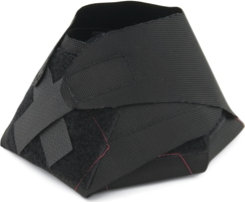Most horse owners, especially those using their horses in competitions, are usually pretty good about keeping their horses vaccinated. But after talking to several dozen rider over the past few months, across several different events, I've come to believe that many horse owners don't routinely get their horses teeth examined or floated. Usually I hear "My horses don't need it", or "I haven't seen any problems with their teeth."
Some of these problems they would expect to see wouldn't necessarily be traceable to a horse's teeth, like head tossing, avoidance of the bit, or getting bracey on the bit while riding. If your horse has these problems, especially if they are recently developed, you should consider a dental exam and floating to either fix the problem or rule out the teeth as a problem, as part of your solution finding.
Other problems that are obviously associated with teeth problems could be the horse dropping feed from his mouth, seeing undigested bits of feed in the manure, and, in the extreme, weight loss.
The horse's front teeth cut hay and the tongue pulls it back to the rear teeth (molars) where they grind the hay using a sideways motion. This is necessary to allow the feed to be ground down, swallowed and more easily digested. If a horse can't adequately grind up his feed, then the digestion process will be degraded and can even cause blockages or impaction colic.
During the sideways chewing and grinding of the feed, the back teeth usually become uneven, creating hooks and points on these teeth which not only will reduce optimum grinding of the feed for digestion, but these hooks and points can cut into the gum or tongue making pressure from a bit painful.
The process of floating teeth involves sedating the horse. My Vet uses a mix of Xylazine and Butorphanol. The sedation lasts long enough to float the teeth and clean the sheath of the geldings, but the horses come out of the sedation pretty quick after that and while I can ride them, I usually give them the day off as they also get their spring vaccinations and sometimes their necks are alittle sore.
I asked my Vet if a decent enough exam can be done without sedation, she replied that "she cannot do a real good assessment of their teeth without sedation, and that likely 80% of the exams without sedation that show no major issues, will require floating once that horse is sedated." In other words, the best exam can't be done without sedation and while the horse is sedated you might go ahead and have his teeth floated.
While I have used non-Vets in the past who used the manual float method and did a good job, the modern method of floating uses a specialty power drill and a ceramic bit which is safer or less of an abrasive on teeth. That's the power drill, called "power floating", that you see my Vet, Amy Starr, DVM of Paws n' Hooves Mobile Veterinarian Services, in the picture at the top left.
Floating should result in, removing all the hooks and points and creating an even surface on the upper and bottom molars of the back teeth to grind feed against. In the picture at right, you can see the hooks and the points on the molars. This horse was floated about 13 months ago, so you can imagine how bad the teeth can get in a short amount of time. He also had a few small cuts on the inside of his mouth where the sharp edges of his teeth cut him.
Floating is painless to the horse as the nerves for the tooth are well below the top surface of the teeth. There is a danger that heat built up of the file or ceramic bit on the tooth can damage the pulp of that tooth, but professional Vets or Equine Dentists trained in floating teeth would know this and eliminate that possibility.
Back to the people who think there horses don't need dental work,......... While the total cost of getting a horse's teeth floated (around $125) my seem like too much money, especially if you have several horses to do, wouldn't it seem like the costs of a Vet's farm call and colic treatment, which you would help prevent with floating, make it seem like a good investment? Not to mention eliminating performance or bit acceptance problems.
I think it's just something we owe the horse. I have had horses, and usually these will be older horses, who needed their teeth floated about every 8-9 months. But generally, I try to get my horses floated once a year, for me that's every April, so I can also get spring vaccinations and blood pulled for their annual Coggins tests.




















No comments:
Post a Comment